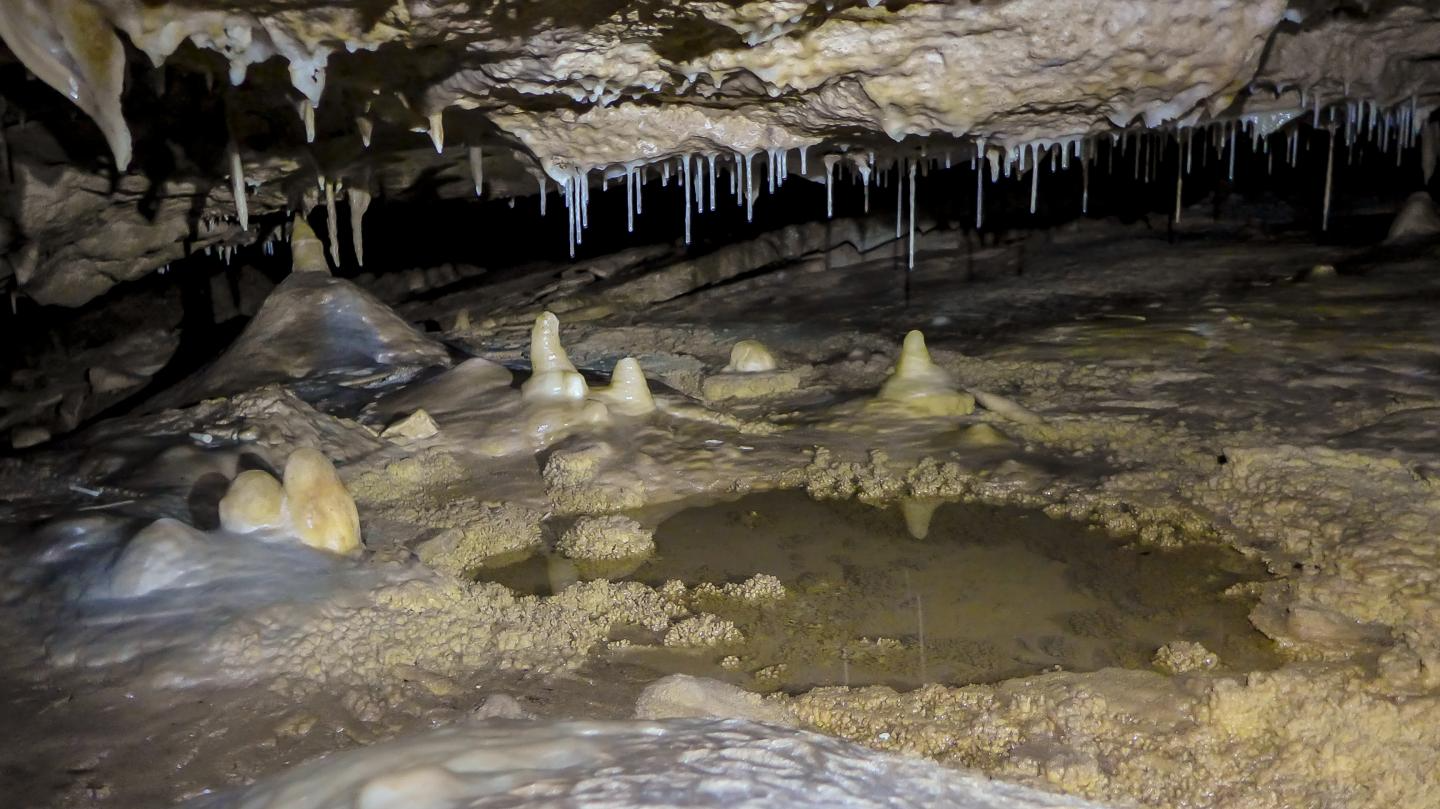Oct 19 2020
In the past thousand years, there was complete destruction of the endemic megafauna of Madagascar and the Mascarene Islands. An international research team analyzed the probable drivers of this extinction by developing an 8000-year record of the previous climate of the island.
 Investigating the drivers of extinction: By analyzing stalagmites from the La Vierge Cave located on Rodrigues, the scientists reconstructed 8000 years of the region’s past climate. Image Credit: Hanying Li.
Investigating the drivers of extinction: By analyzing stalagmites from the La Vierge Cave located on Rodrigues, the scientists reconstructed 8000 years of the region’s past climate. Image Credit: Hanying Li.
The findings of the study revealed that although the ecosystem was resistant to previous climate stress it crumbled with a rise in human activities.
Christoph Spötl from the Innsbruck Quaternary Research Group was one of the members of the international research team. The findings have now been reported in the Science Advances journal.
Almost all of the Madagascan megafauna— which includes the well-known Dodo bird, giant tortoises, the Elephant Bird which stood 3 m tall and weighed around half a ton, and the gorilla-sized lemurs—disappeared between 1500 and 500 years ago.
Did humans overhunt these animals to extinction? Or did they vanish due to climate change? There are various hypotheses, but the actual reason for the megafauna collapse continues to be mysterious, and a topic of intense debate.
The Mascarene islands located to the east of Madagascar are of unique interest as they are the last islands on the planet to be colonized by humans. Interestingly, the islands’ megafauna collapsed within just 200 years after human settlement.
In a study published recently in the Science Advances journal, an international research team discovered that it was possibly a “double whammy” of increased human activities together with a specifically acute spell of region-wide aridity, which may have led to the elimination of the megafauna.
The team rejects climate change as the only reason, and instead proposes that the effect of human colonization was an essential contributor to the megafaunal collapse. Hanying Li, a postdoctoral scholar at the Xi’an Jiaotong University in China and the lead author of this study, compiled an elaborate history of the regional climate changes.
The new paleoclimate record’s main source was derived from the small Mascarene island of Rodrigues in the southwest Indian Ocean, around 1600 km to the east of Madagascar.
An island so remote and small that one will not find it on most schoolbook atlases.”
Gayatri Kathayat, Study Co-Author and Associate Professor of Climate Science, Xi’an Jiaotong University
Analysis of Cave Deposits
Li and his collaborators developed their climate records by investigating the trace elements as well as oxygen and carbon isotopes from every incremental growth layer of stalagmites, which was collected from one of several caves present on this island.
Many such analyses were performed at the Quaternary Research Group at the Institute of Geology.
Variations in the geochemical signatures provided the information needed to reconstruct the region’s rainfall patterns over the last 8000 years. To analyze the stalagmites we used the stable isotope method in our lab in Innsbruck.”
Christoph Spötl, Professor, University of Innsbruck
Regardless of the distance present between the two islands, at Rodrigues and Madagascar, the summer rainfall is affected by the same global-wide tropical rain belt that fluctuates north and south with the seasons.
“And when this belt falters and stays further north of Rodrigues, droughts can strike the whole region from Madagascar to Rodrigues,” explained Hai Cheng, senior co-author of the study.
“Li’s work from Rodrigues demonstrates that the hydroclimate of the region experienced a series of drying trends throughout the last 8 millennia, which were frequently punctuated by ‘megadroughts’ that lasted for decades,” noted Hubert Vonhof, who is a co-author of the study and scientist at Max Planck Institute of Chemistry in Mainz, Germany.
Resilient to Climate Stress
The latest drying trends in the region began approximately 1500 years ago when the archaeological and proxy records started to exhibit definitive signs of higher human presence on the island.
While we cannot say with 100 percent certainty whether human activity, such as overhunting or habitat destruction, was the proverbial last straw that broke the camel’s back, our paleoclimate records make a strong case that the megafauna had survived through all the previous episodes of even greater aridity. This resilience to past climate swings suggests that an additional stressor contributed to the elimination of the region’s megafauna.”
Ashish Sinha, Professor of Earth Science, California State University
“There are still many pieces missing to fully solve the riddle of megafauna collapse. This study now provides an important multi-millennial climatic context to megafaunal extinction,” stated Ny Rivao Voarintsoa from KU Leuven in Belgium, a native of Madagascar, who also contributed to this study.
The study highlights the decimation of flora and fauna of Mauritius and Rodrigues: “Both islands were rapidly stripped of endemic species of vertebrates within two centuries of the initial human colonization, including the well-known flightless ‘Dodo’ bird from Mauritius and the saddle-backed ‘Rodrigues giant tortoise’ endemic to Rodrigues,” added Aurele Anquetil André, who is a reserve manager and chief conservator at the Francois Leguat Giant Tortoise and Cave Reserve at Rodrigues.
“The story our data tells is one of resilience and adaptability of the islands’ ecosystems and fauna in enduring past episodes of severe climate swings for eons—until they were hit by human activities and climate change,” concluded the researchers.
Journal Reference:
Li, H., et al. (2020) A multimillennial climatic context for the megafaunal extinctions in Madagascar and Mascarene Islands. Science Advances. https://doi.org/10.1126/sciadv.abb2459.